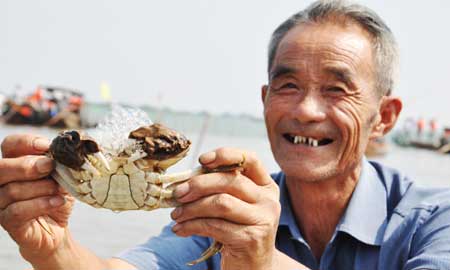Economy
Crab farmers shelling out to protect product
By Wang Hongyi (China Daily)
Updated: 2010-09-19 11:23
 |
Large Medium Small |
|
 |
|
A farmer holds up a hairy crab pulled from the Yangcheng Lake, Jiangsu province. The crab, a Chinese delicacy, hit the market on Friday as this year's season kicked off. Zhu Guigen / For China Daily |
The hairy crabs, known as dazha crabs, are reared in several places nationwide but those from the Yangcheng Lake in Suzhou, in East China's Jiangsu province, have long been acknowledged as the best in an industry that has been dogged by inferior crabs being passed off as the real thing.
Now, in a bid to guarantee hairy crabs sold as Yangcheng Lake crabs really do come from the lake, the genuine crabs will no longer be sold at regular markets. Starting this year, they will only be available from authorized supermarkets, exclusive franchise stores and elite hotels, according to the Suzhou-based Yangcheng Lake Hairy Crab Association.
"Customers should be aware of the fact that hairy crabs that are said to be from the Yangcheng Lake that they find at wet markets will not be the real thing," said an official from the association.
The association has also spent money on a series of other measures to try to sink the fake crab market.
An anti-forgery lock, which carries the name of the distributor and an exclusive 12-digit number, will be attached to each crab. Customers can verify whether the crab is genuine by phone, text message or the Internet.
Meanwhile, hairy crabs will be packed in uniform wrapping this year and all handlers of the product in the supply chain will be licensed.
This year, the Yangcheng Lake is set to produce about 2,000 tons of the hairy crabs, which is about the same level as last year. Around half of the crabs will be sold overseas.
Yang Weilong, chairman of the Yangcheng Lake Hairy Crab Association, estimated that the price will rise by 10 to 20 percent compared to last year because of the expensive security measures.
The price of the crabs varies with size but a 200-gram male or a 150-gram female will sell for between 120 and 130 yuan ($17 and $19).
"Crab quality this year is good, but the number of big crabs where the male crabs weigh more than 200 grams or the female ones exceed 150 grams is less than last year," said a crab saleswoman surnamed Wang.
"This year's hot weather made the time when the crabs began to shed their shells later than last year," she said. "It is still not the best time to eat crab. The best time might be in early October."
A customer service representative from the Shanghai Jindazha Hairy Crab Company told China Daily that good quality and large hairy crabs will mainly be marketed in late September.
She said the presales of vouchers for the Yangcheng Lake hairy crabs through her company have been brisk.
Thanks in part to Expo 2010, the sales of the Yangcheng Lake crabs this year is expected to boom.
| |||||||
"For as long as I can remember, at this time of year, my family gets together to enjoy the delicious hairy crabs," added local resident Xiao He. "While they are still delicious, the crabs are getting more and more expensive. I don't think ordinary people like us can afford them now."
Earlier this month, an online post claimed antibiotics and contraceptives had been used to make the hairy crabs grow faster.
Yang Weilong denied the allegations and claimed the crabs were 100 percent safe.


